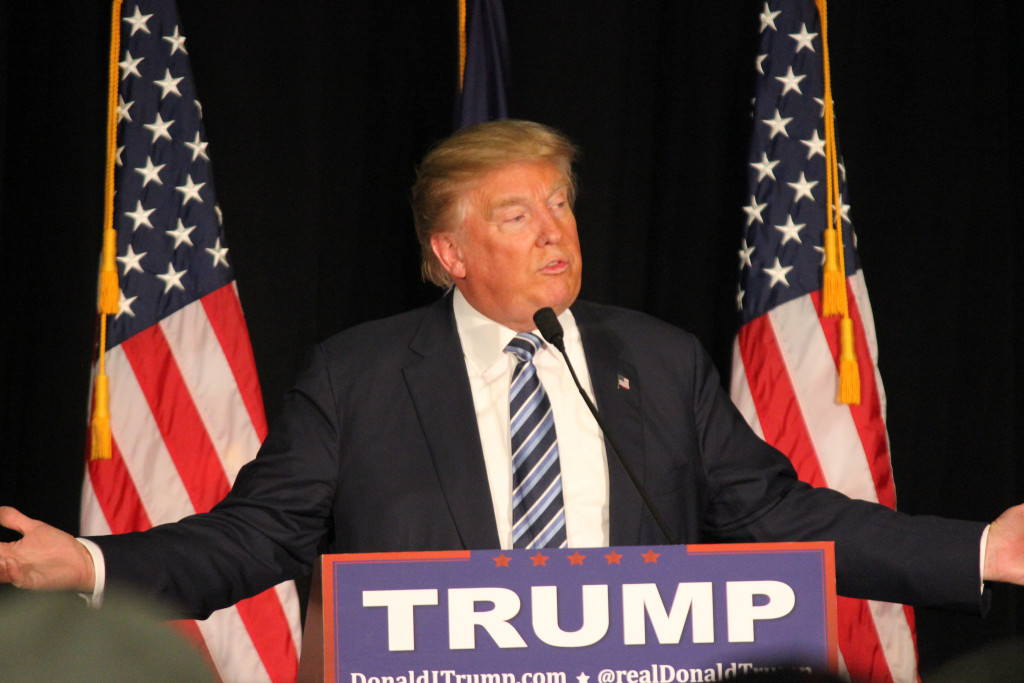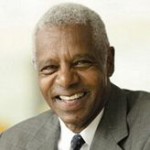
Donald Trump speaks at a December 2015 campaign stop at Mid-America Center in Council Bluffs, Iowa. Photo Credit: Matt A.J./Flickr
In the final weeks of his campaign, Donald Trump has reiterated his call to build a wall between Mexico and the United States. A Pew Research survey shows his supporters are united by, perhaps more than any other issue, anti-immigrant sentiment.
To him, like many of his supporters, this wave of invading “criminals” supported and abetted by the Mexican government is a dire threat to the nation.

Lise Nelson
Put aside for a moment the racist dimensions of this rhetoric. The wall argument assumes the cause of undocumented migration originates in Mexico, in the Mexican government or in the criminal intent of migrants. A border wall makes intuitive sense if you assume the cause of undocumented migration is external to the United States.
This is a belief that ignores not only the ease of breaching such a wall, but more fundamentally the economics of low-wage, undocumented labor migration that generated these flows in the first place.
Over the last two decades, U.S. recruitment of workers without documentation has drawn millions over the border even as we have invested billions in policing, barricades and surveillance on that same border.
My research, like that of others, sheds light on the day-to-day incentives employers have for recruiting undocumented workers. The cumulative effect of these recruitment practices, which occur in nearly every geographic region of the country, is to invite large-scale migration across the U.S.-Mexico border. It is a draw that is highly resistant to our efforts to stop it. From this perspective, the origins of the current situation, in which 6.4 percent of our workforce lacks documentation, lie north of the border as much as south of it.
A preference for the undocumented
My colleagues and I have conducted research in U.S. communities where undocumented Latino immigrants live and work, including interviews with their employers. We focused on small businesses in rural Colorado and Georgia. We investigated how and why entrepreneurs in construction, landscaping and low-wage service industries began actively seeking to hire undocumented Latino immigrants starting in the mid-1990s even though immigrant workers were largely absent from these places prior to that time.
What started for many as a short-term solution to fill a labor gap turned into a preference for hiring undocumented workers. Recruitment efforts thus intensified, causing a significant growth in the Latino immigrant population in both places. In a rural Georgia county, the Latino population increased 1,760 percent between 1990 and 2010, due to the increase in these recruitment efforts by businesses involved in construction, landscaping, cleaning and food provision.
Why did businesses that rely on low-wage workers develop a preference for immigrants and particularly undocumented ones?
In interviews, employers describe the undocumented Latino immigrants they hire as among the most reliable, honest and hardworking employees they have ever had. As one Georgia employer described it:
“I think about, if I had to get rid of the nine Hispanics that I’ve got tomorrow and replace them with locals, to get the same amount of output, I would have to hire fifteen instead of nine and I’d probably have to pay them $1 an hour more each, and that figures up quick. And there’s sometimes that you just can’t find people to do the work.”
Most employers we interviewed began by the late 1990s to organize their businesses around the productivity and discipline offered by an undocumented immigrant workforce.
This view not only contradicts Trump’s assumptions about undocumented low-wage immigrants’ “criminal” character, it sheds light on their role in a range of economic sectors across the country. Over the past two decades, low-wage industries across the U.S. have increasingly recruited and relied on immigrant workers, many of whom lack documentation.
The economic benefits created by the presence of low-wage, undocumented immigrant workers are experienced not only by the American businesses that hire them, but also by consumers. Where our research was conducted, consumers enjoyed lower-cost housing and a range of cheaper restaurant, landscaping and cleaning services due to their presence. These kinds of economic benefits explain why Donald Trump hired undocumented Polish workers to help build Trump Tower.
The ‘ideal’ worker
People who enter the United States without documents are usually motivated by profound economic need, a need that animates them to embark on a dangerous and uncertain journey. Poverty places them in a position of vulnerability that often proves to be an asset to their U.S. employers. Eager for employment, they often accept difficult, irregular and low-paying jobs they can do without being fluent in English.
The threat of deportation adds an additional layer of insecurity and vulnerability. Undocumented residents live in fear. That applies even to those who are raising citizen children, who are gainfully employed over many years, who have no criminal record and who pay sales, property and income taxes. They live with a constant threat of deportation and a deep sense of being viewed with suspicion by some in the communities where they live. It is a suspicion often tied to racial animosity. Latino residents are frequently profiled as “illegal” – regardless of their actual legal status or nationality, a trend that affects not only labor markets but whole communities.
The combination of poverty and fear of deportation inspires most undocumented immigrants to tie themselves closely to their employers. They work hard and avoid public spaces. In the words of sociologists Jill Harrison (University of Colorado-Boulder) and Jennifer Lloyd (University of Wisconsin-Madison), undocumented workers become “compliant workaholics” in order to survive. Employers in low-wage industries have found this disciplined, loyal and flexible workforce very attractive.
The economic power of this process is resistant to border control and physical barriers installed over the last two decades – precursors to the fantasy of an impenetrable wall. It is telling that the steady growth of the undocumented workforce between the mid-1990s through the mid-2000s happened despite a nearly constant growth of spending on border patrol, new barriers and surveillance. Only in the wake of the 2008 economic crash, which dramatically slowed recruitment processes, did the unauthorized Mexican workforce in the United State start to decline.
Trump, of course, pairs his call for a huge wall with a promise to enforce mass deportation. This is equally unrealistic in economic terms. Economists have estimated that if Trump were successful in removing all undocumented workers, our GDP would fall by 5.7 percent. This is in addition to the cost of such a deportation effort, which is estimated at requiring US$400 billion in new federal spending. Finally, there is the human cost of this plan given that in 2012 4.5 million U.S. citizen children have one or more undocumented parents.
While there is a clear economic logic to the presence of millions of undocumented workers in the United States, a logic that I believe we misunderstand at our peril, the current system does not provide justice nor a decent life for low-wage immigrant or nonimmigrant workers.
I believe comprehensive immigration reform would make it possible for undocumented workers to legalize, a place from which they could demand better wages and working conditions. Their improved situation would actually help level the playing field – eliminating the unfair advantage of illegal status in the labor market – for nonimmigrant workers. Legalization and a path to citizenship not only provide a ethical path out of our current situation, they make economic sense as well.

Lise Nelson is an associate professor of Women’s, Gender, and Sexuality Studies and an associate professor of geography at Pennsylvania State University
This article was originally published on The Conversation. Read the original article.











